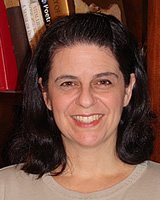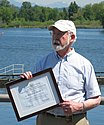Research
Allen L. Edwards Endowed Lectureship in Psychology
Professor Allen Louis Edwards was affiliated with the University of Washington Department of Psychology for half of a century, from his arrival in Seattle in 1944 as an Associate Professor to his death in 1994. Edwards was an outstanding teacher, researcher, and writer who is credited with changing the way modern psychological research is conducted by introducing modern statistical techniques into the science. Three of his seven books are considered landmarks in the field.
Edwards is also known for developing personality tests, in particular the Edwards Personal Preference Schedule (EPPS), which was designed to eliminate the test-taker's bias toward socially desirable answers. Edwards endowed the Edwards Lectureship to bring nationally and internationally renowned psychologists to campus for short visits to interact with faculty and students. The first Edwards Lecture was delivered by a former Ph.D. student of Edwards, Professor Mark Pagel of University of Reading, England, on May 24, 1999. Since the inaugural Edwards Lecture, we have hosted an impressive list of distinguished scholars.
In each year since 2004, three of the Edwards Lecturers are invited to participate in our public Psychology Lecture series. In this series, world renowned leaders in a variety of Psychology subdisciplines join our faculty for three evening public lectures on important issues facing our society. The topics vary each year, and they cover issues in mental health, language and cognitive development, social and emotional regulation of behavior, society and individual behaviors, and the neuroscience of normal and abnormal behavioral functions. These lectures are recorded for future viewing on UWTV. Past lectures are available for viewing.
Three Psycholgy Department faculty will soon be featured in the 5th public Psychology Lecture Series: Dr. Jessica Sommerville (Feb. 17), Dr. Michael Beecher (Feb. 24), and Dr. Liliana Lengua (Mar. 3). The common theme will be the Development of Behavior, and descriptions of their individual research program can be found below. Also you will find the names of world renowned colleagues who have been invited to participate in each of the lectures. Save the date, and we hope to see you there!
How do children learn about goal-directed behavior?
February 17, 2010, 7-9 pm, Kane Hall Room 120
Jessica Sommerville, Associate Professor: A Cognitive Perspective

As adults, we are adept at understanding the behavior of other people around us. Key to this process is our ability to think about our own and other people's actions as guided by goals or intentions. For instance, upon seeing a woman reach toward a cookie jar, we go beyond focusing on the surface properties of the act (e.g., the speed and trajectory of the woman's reach) to interpret this action as directed toward the goal of obtaining a cookie. Our tendency to view action as motivated by goals is a powerful tool in our ability to navigate our social environment. It enables us to monitor and modify our own behavior, to predict the outcome of the actions of others, and to both teach and learn a variety of activities and skills. Professor Sommerville’s research focuses on understanding the origins of the ability to represent human action in terms of goals and intentions.

A critical question addressed by Professor Sommerville is identifying when an understanding of action, as guided by goals, develops. Her research has shown that the precursors to action understanding are present in infants as young as six months of age and that there is a rapid development over the subsequent six months. Her research has also addressed the factors that contribute to changes in infants' and children's action representations. For example, her research has shown that self-produced action is critical to the development of action understanding. In addition, her research has shown that adult preferences, as expressed through language, play an important role in infants’ ability to understand others in a truly psychological fashion.
Visit Professor Sommerville’s lab website:
http://depts.washington.edu/eccl
For recent news coverage, see:
http://uwnews.org/uweek/article.aspx?Search=sommerville&id=46580
http://uwnews.org/uweek/article.aspx?Search=sommerville&id=44029
Dr. Rebecca Saxe (Assistant Professor of Cognitive Neuroscience Fred and Carole Middleton Career Development Professorship, Dept. of Brain and Cognitive Sciences, MIT) will be joining Dr. Sommerville on February 17, 2010.
What can singing birds teach us about how children learn language?
February 24, 2010, 7-9pm, Kane Hall Room 120
 Michael Beecher, Professor: A Comparative Perspective
Michael Beecher, Professor: A Comparative Perspective
Language is often considered to be a uniquely human ability and the development of language in children is one of the most important developmental milestones. But how unique is it? The development of acoustic communication in songbirds has many parallels with human language learning. Like human language, songbirds learn to communicate very early in life. In addition, there is an early “critical” period for song learning where exposure to song is essential for normal development. The same is true for human language and obvious to any adult who has experienced difficulty learning a second language. Both song and human language are fundamentally social and interactive. Professor Beecher’s research has demonstrated that not only must a young songbird participate in singing, young birds are preferentially attracted to the sound of birds singing to each other compared to song in isolation. In other words, they are attracted to the social context of singing. Parallel research in humans has also shown that social interaction is crucial for language learning. Another similarity is that song is learned in stages. The “babbling” stage in humans is well known and believed to be an important precursor for human language development. A similar “subsong” stage is evident in songbirds and Professor Beecher’s research has shown that this “song babble” is critical for normal song development.
Given all the similarities with birdsong, human language – and the process of learning it – is perhaps not so unique after all. By understanding the developmental process in a species as different as a songbird, we can more easily identify general learning mechanisms and strategies and, ultimately, discover the truly unique aspects of human language.
For more information on Professor Beecher’s research, visit his website at:
http://faculty.washington.edu/beecher/
For recent news coverage of Professor Beecher’s research, see:
http://www.seattlepi.com/local/411353_sparrow20.html?source=mypi
Dr. Michael H. Goldstein [Department of Psychology, Cornell University, Ithaca, NY] will be joining Dr. Beecher for the February 24, 2010 lecture.
How do children cope with disadvantage, stress, and family disruption?
 March 3, 2010, 7-9pm, Kane Hall Room 120
March 3, 2010, 7-9pm, Kane Hall Room 120
Liliana Lengua, Professor: A Clinical Perspective
Self-control is a critical skill that underlies children’s development of social and emotional competence. It is also a key predictor of young children’s school readiness and academic success. Children growing up in economically disadvantaged contexts are at risk for having lower self-control. Professor Lengua’s research is aimed at understanding the reasons for this and at identifying what parents can do to foster better self-control and competence in their children.
Economic hardship can affect multiple aspects of a family’s life, increasing the likelihood of stressful events, residential changes, and other disruptions. These challenging conditions may affect preschool children’s developing self-control by the effects they have on children’s stress physiology. Professor Lengua studies how problems of children’s neuroendocrine system – their stress hormones – might play a role in children’s developing self-control.
A major focus of Professor Lengua’s research is studying the things parents and families can do to maintain a positive family climate in the face of life’s challenges. Her research has shown that the reactions parents have towards stressful events play a critical role in promoting self-control in their children. Families experiencing significant strain may have difficulty maintaining positive family relationships. There can be increased conflict, distress and demoralization among family members. In turn, this can make parenting difficult. Conversely, when families are able to maintain positive parenting behaviors in the face of strain, children can be buffered from the effects of stress.
For more information on Professor Lengua’s research, visit her websites at:
http://depts.washington.edu/cfnkw/
http://depts.washington.edu/ccfwb/
Dr. Phil Fisher [(Clinical) Professor of Psychology, University of Oregon] will be joining Dr. Lengua for the March 3, 2010 lecture.
http://psychweb.uoregon.edu/people/fisher-phil
Faculty Accomplishments
A large number of our faculty are widely recognized for their amazing research discoveries and/or impact on our local community. The following is a list of recent recognitions and accomplishments.
2009
 |
|
 |
|
 |
|
 |
|
 |
|
 |
|
 |
|
 |
|
 |
|
 |
|
  |
|
 |
|
 |
|
 |
|
 |
|
 |
|
 |
|
 |
|
 |
|
 |
|
 |
|
 |
|
 |
|
 |
|
 |
|
  |
|
 |
|
  |
|
|
Three faculty members’ lectures on UWTV were ranked in the top ten viewed for 2008. Tony Greenwald ’s “The Psychology of Blink: Understanding How Our Minds Work Unconsciously - Part 1” was the most popular video on UWTV in 2008, coming ahead of “Bill Gates Unplugged.” “Psychology of Blink, Part 2” was the seventh most viewed video. Ana Mari Cauce ’s “Family Values and Culture in the Successful Adjustment of Ethnic Minority Adolescents, Part 1” came in sixth. Scott Murray ’s “Vision and the Brain,” filmed in 2007, came in tenth for 2008. These lectures were presented in the “Allen L. Edwards Psychology Lectures: Research Serving Humanity” series. |
|
|
Geoffrey Boynton , Eliot Brenowtiz , Cheryl Kaiser , Jeansok Kim , Alan Marlatt , Scott Murray , and the Clinical Psychology Program all received mention in the Awards and Honors section of an on-line version of Arts & Sciences Perspectives magazine. |
|
|
Both Marsha Linehan and John Gottman made the “newsmakers” section of University Week. http://uwnews.org/uweek/article.aspx?id=50769 |
|
|
PROMOTIONS : Liliana Lengua and Jeansok Kim were promoted to Professor, Lynn Katz to Research Professor, and Jessica Sommerville to Associate Professor with tenure. A huge congratulations to these stellar faculty members! |

